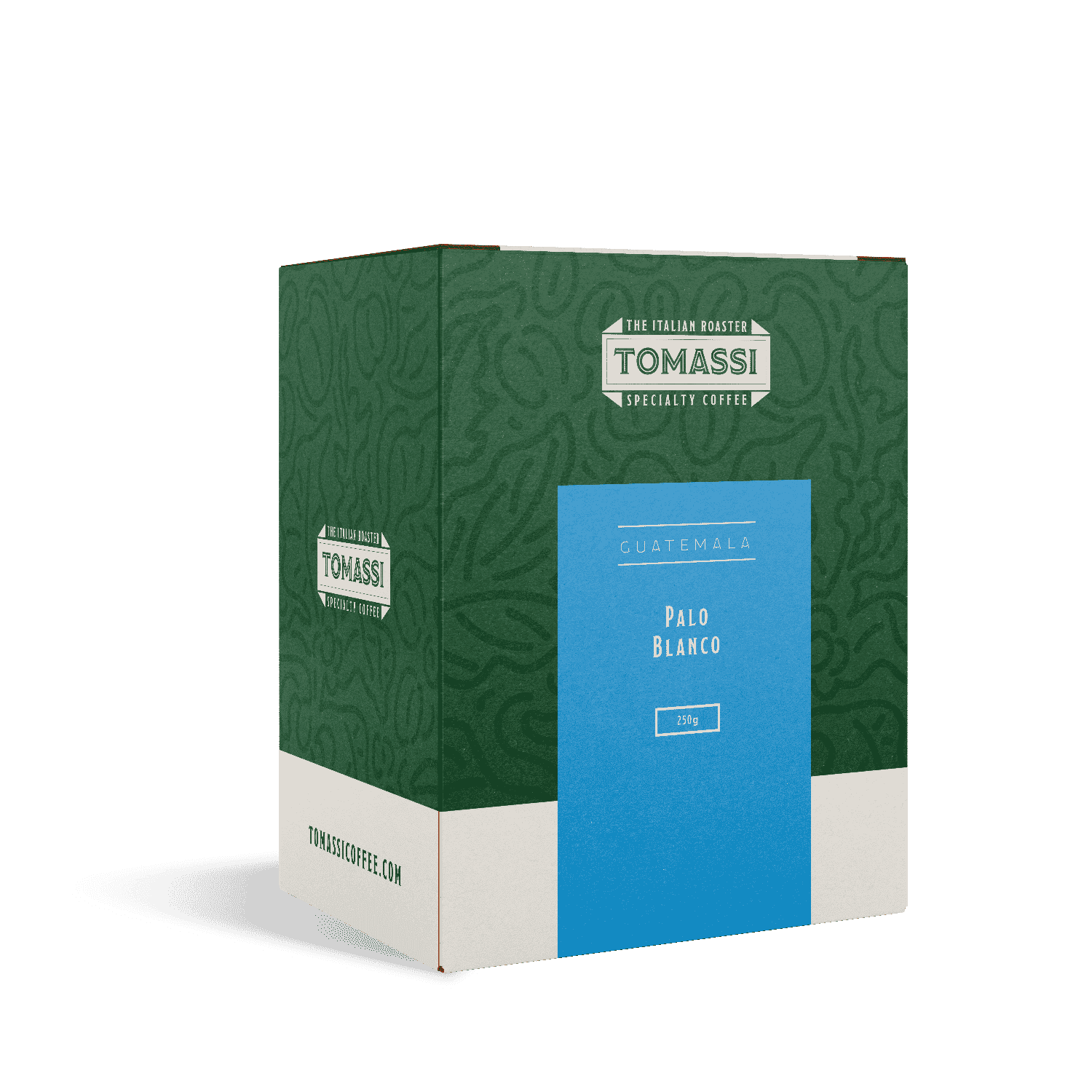No products in the cart.
Guatemala: Palo Blanco
Guatemala • Palo Blanco Huehuetenango FW Organico
Owner Ivan Ovalle holds a degree in engineering which he has used to help increase Finca Palo Blanco’s water efficiency and to ensure that workers pick only the ripest cherries with the highest sugar content. The result is a deliciously sweet, full-bodied coffee with notes of berries and chocolate.
Questo articolo è disponibile anche in: ![]() Italiano
Italiano ![]() English
English
Details
Coffee grade: Huehuetenango organic fw
Farm: Finca palo blanco
Varietal: Catuai, caturra
Processing: Fully washed
Altitude: 1.550 to 1.950 metres above sea level
Owner: Ivan Federico Ovalle Altuve
Sub-region / town: Aldea Chichinabaj, La Democracia
Region: Huehuetenango
Farm size: 60 hectares
Coffee-growing area: 50 hectares
Certifications: Organic
Harvest months: November – April
Roast: Filter/Espresso
Aroma: Almond Flowers Honey Dried Fruit
Cultivation
The farm is 60 hectares large, 10 of which are destined to forest reserves, while the remaining 50 hectares are planted with coffee trees. Besides growing Bourbon, Catuai, Caturra and Pacamara varieties, Ovalle also cultivates lesser known varieties like the SL28, Marsellesa and Parainema at the farm’s higher altitudes. This coffee is also organic, which means it is cultivated without use of artificial fertilizers or pesticides. Organic farming can also include ecologic cultivation methods that aim to reduce erosion, increase irrigation and improve overall soil health. With the aid of an organic certification, producers can charge higher fees and all the farm and the people that work on it are not exposed to dangerous chemical substances. Fewer chemicals used on a farm also means less run-off and fewer chemicals finding their way in our global water systems.
Harvest and post-harvest
Ovalle is meticulous about teaching workers to pick only ripe red cherries at the right moment. He has used the Brix measurement (focused on sugar content) to understand the optimal moment at which to pick cherries. Workers selectively handpick cherries after proper training. Plato Blanco is committed to the protection of the environment from the negative effects of coffee cultivation. Ovalle says that it has been hard to improve and refine Palo Blanco’s processing methods for over a decade. He has focused on the reduction of water consumption year after year and has been collaborating with various certification programs to improve the farm’s environmental and social impact. Besides being organic, the farm uses an Ecopulper that significantly reduces the amount of water used during pulping. After pulping, the coffee is dry fermented for 36-48 hours, depending on the climate. Then, the parchment is washed in channels and laid to dry on a terrace. After washing, the parchment is laid on patios, where it is regularly raked for 1,5 or 2 days. . It is then transferred to a greenhouse covered with plastic sheets, where it dries on raised beds for about 6 days. Total drying time amounts to 7-10 days, depending on the climate. Approximately 40% of the farm’s production is fully washed. The dry parchment is then bagged and stored on the farm for 30 to 45 days before being transferred to Quetzal dry mill in Escuintla.
About Huehuetenango
Huehuetenango is famous for its high altitude and consistent weather. The region lies at a nexus of hot air blowing eastwards from the plains of Tehuantepec in Oaxaca, Mexico, and cool air coming down from the Cuchumantanes Mountains. The meeting of these two currents of air creates a microclimate that keeps frost under control and enables coffee cultivation at higher altitudes: coffee production at 2,000 metres above sea level is common. These conditions are perfect for the production of the sparkling acidity and characteristic fruity flavours of the region.
Caffè in Guatemala
Guatemala boasts a variety of cultivation regions and conditions that produce spectacular coffee. Today, the country is revered as the producer of some of the most flavourful and nuanced cups of coffee in the world. We are proud to work with several exceptional national partners to bring these coffees around the world. The Guatemalan coffee industry experienced a major setback with the arrival of Coffee Leaf Rust (CLR) in Latin America in 2010. The epidemic peaked in severity in 2012 and, even though CLR keeps hitting some farms, Guatemala continues to produce high-quality, record-breaking coffee. In 2017, new and varied processing methods pushed prices at the Guatemalan Cup of Excellence contest to unprecedented levels. The quality of coffee produced in Guatemala is increasing, overall, due to the diversity of the industry’s producers. . There is a growing number of smallholder farmers that produce exceptional coffee at high altitudes. . Cooperatives are becoming more alluring for many smallholder farmers because they often offer them financing and other support for improving their farming and processing and are often able to offer higher prices for cherries compared to middlemen. Many cooperatives have started quality improvement formation for farmer members and are getting better at helping members market their specialty coffee.
| Grammatura | 1Kg, 250gr |
|---|---|
| Tostatura | Light, Medium |
| Formato | Beans, Ground for espresso, Ground for filter, Ground for moka |

Reviews
There are no reviews yet.